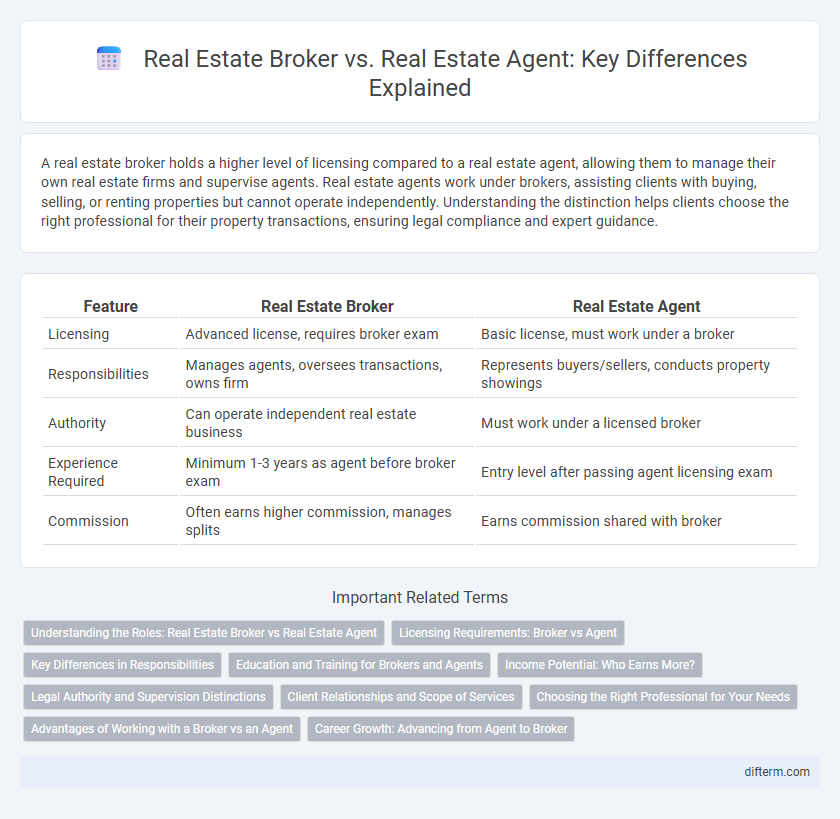A real estate broker holds a higher level of licensing compared to a real estate agent, allowing them to manage their own real estate firms and supervise agents. Real estate agents work under brokers, assisting clients with buying, selling, or renting properties but cannot operate independently. Understanding the distinction helps clients choose the right professional for their property transactions, ensuring legal compliance and expert guidance.
Table of Comparison
| Feature | Real Estate Broker | Real Estate Agent |
|---|---|---|
| Licensing | Advanced license, requires broker exam | Basic license, must work under a broker |
| Responsibilities | Manages agents, oversees transactions, owns firm | Represents buyers/sellers, conducts property showings |
| Authority | Can operate independent real estate business | Must work under a licensed broker |
| Experience Required | Minimum 1-3 years as agent before broker exam | Entry level after passing agent licensing exam |
| Commission | Often earns higher commission, manages splits | Earns commission shared with broker |
Understanding the Roles: Real Estate Broker vs Real Estate Agent
A real estate agent is licensed to assist clients in buying, selling, or renting properties but typically works under the supervision of a real estate broker. A real estate broker holds advanced licenses and can operate independently, manage agents, and own a real estate firm. Understanding these distinctions is essential for clients seeking professional guidance and for those pursuing a career in real estate.
Licensing Requirements: Broker vs Agent
Real estate brokers must obtain a higher-level license that requires additional education, experience, and passing a more comprehensive exam compared to real estate agents. Agents operate under the supervision of brokers and typically need only to complete pre-licensing courses and pass a state exam to get licensed. Licensing requirements for brokers often include several years of agent experience, specialized coursework in real estate law and management, and adherence to stricter regulatory standards.
Key Differences in Responsibilities
A real estate broker holds a higher license and assumes greater responsibilities such as managing a brokerage, supervising agents, and ensuring legal compliance in transactions. Real estate agents work under brokers, focusing primarily on representing buyers or sellers, marketing properties, and facilitating negotiations. Brokers oversee contract processes and maintain fiduciary duties, while agents concentrate on client interactions and property showings.
Education and Training for Brokers and Agents
Real estate brokers undergo more extensive education and training compared to agents, typically completing advanced courses in real estate principles, law, and brokerage management. Agents must first obtain a real estate license through foundational coursework and pass a state exam, while brokers often require additional experience and must pass a comprehensive broker's exam. Continuing education is mandatory for both, but brokers face higher standards designed to equip them for supervisory and business management roles.
Income Potential: Who Earns More?
Real estate brokers typically earn more than real estate agents due to their ability to manage multiple agents and receive a portion of their commissions. Agents earn income primarily through commissions on individual property sales, usually ranging from 3% to 6% of the sale price. Brokers leverage their managerial role and additional licensing to increase earnings, often resulting in higher overall income potential compared to agents.
Legal Authority and Supervision Distinctions
A real estate broker holds a higher level of legal authority than a real estate agent and is licensed to operate independently, manage agents, and run brokerage firms. Real estate agents must work under the supervision of a licensed broker, limiting their capacity to enter into contracts or oversee transaction processes without broker approval. The broker's legal responsibility includes ensuring compliance with real estate laws and ethical standards, while agents execute tasks under this umbrella of oversight.
Client Relationships and Scope of Services
Real estate brokers possess advanced licensing that allows them to oversee agents and manage client transactions with greater authority, offering a broader scope of services including property management and brokerage firm operations. Real estate agents primarily focus on facilitating property buying, selling, and leasing directly with clients, providing personalized guidance and market insights. Both roles prioritize building strong client relationships, but brokers often handle more complex negotiations and legal responsibilities.
Choosing the Right Professional for Your Needs
Selecting between a real estate broker and a real estate agent depends on the complexity of your transaction and level of expertise required. Real estate brokers hold higher licensing credentials and can manage their own firms, providing a broader range of services and oversight. Understanding these distinctions helps ensure you choose the professional best suited to navigate your buying or selling process efficiently.
Advantages of Working with a Broker vs an Agent
Real estate brokers have advanced licensing and training compared to agents, allowing them to offer deeper market insights and oversee complex transactions, which ensures smoother property deals. Brokers typically manage a team of agents, providing greater access to resources, wider networks, and enhanced negotiation power for buyers and sellers. Clients benefit from brokers' comprehensive understanding of legal and financial aspects, reducing risks and improving overall transaction efficiency.
Career Growth: Advancing from Agent to Broker
Advancing from a real estate agent to a broker involves obtaining additional licenses, which significantly enhances career growth opportunities and earning potential. Brokers have the authority to manage their own real estate firms, supervise agents, and handle complex transactions, positioning them as leaders within the industry. This progression often leads to greater financial rewards, increased professional autonomy, and expanded networking capabilities.
real estate broker vs real estate agent Infographic

 difterm.com
difterm.com